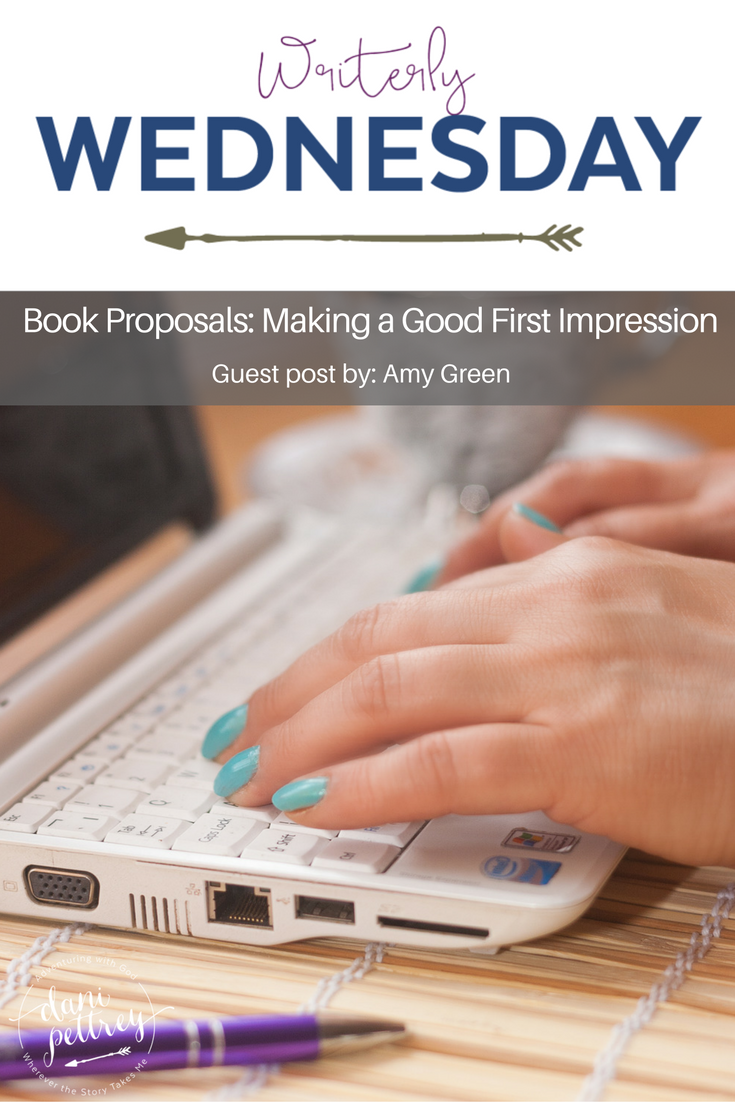Book Proposals: Making a Good First Impression - with Amy Green
 There is no one right way to go about proposing marriage—but there are several wrong ways (I’m looking at you, Mr. Collins from Pride and Prejudice, and you St. John Rivers from Jane Eyre). A proposal might be big and flashy with a ton of effort behind it, or it might be simple and heartfelt. But here are a few things it shouldn’t be:
There is no one right way to go about proposing marriage—but there are several wrong ways (I’m looking at you, Mr. Collins from Pride and Prejudice, and you St. John Rivers from Jane Eyre). A proposal might be big and flashy with a ton of effort behind it, or it might be simple and heartfelt. But here are a few things it shouldn’t be:
Wordy.
Cringe-worthy.
Boring.
It’s the same thing with book proposals.
Since I’m on the marketing team at Bethany House Publishers, I sit on the publication board (pub board) that evaluates proposals from new and veteran authors that our acquisition editors find most promising. As I go through these examples, I’ll talk about dos and don'ts—but remember that nothing is absolute. What I’ll be telling you are best practices from my experience in the Christian fiction publishing industry.
I also thought it would be more helpful to give tips on the content of your proposal instead of explaining terms and going over the basics of what a proposal includes. If you want a primer before you start, I’d suggest going to industry blogs to learn more.
Rachelle Gardner's article How to Write a Book Proposal and Steve Laube's Hints for a Great Cover Letter are a great place to start.
As I looked over five proposals of debut authors who have recently published with Bethany House, what stood out to me was that no proposal was exactly alike. Their synopses are different lengths. Some simply list comparable titles, others explain how they’re similar and different, and others leave out that section altogether. If an agent or editor tells you exactly what they want in a proposal, follow that, of course. Otherwise, keep in mind that your proposal should give the editor a professional overview of your manuscript and yourself as a writer.
That said, there were some things I noticed the successful proposals had in common.
ALL of the proposals I looked at:
Gave a complete overview in the synopsis.
The length of this synopsis ranged from 1-3 pages, but all of them presented the main characters, the story’s conflict, and how that conflict developed and resolved. (You have to give away the ending!) Writing a good synopsis is hard. Make sure you have others critique it for you, particularly those who haven’t read your novel. Ask them if the flow of the story is clear.
Listed specific marketing strategies.
Some named local media they would contact about book releases, others sketched out a plan for a street team, and others talked about speaking opportunities with libraries, book clubs, and homeschooling conferences they were excited to pursue. Most dedicated a page or two to outline a marketing plan.
Showed they understood the market.
By that, I mean they:
- Listed organizations they had joined, like RWA or ACFW.
- Gave 3-5 comparable titles to their manuscript.
- Could explain the target audience for their novel.
- Stated that the manuscript was complete and gave a word count that fit the range of what we usually publish. (Most agents/editors will only consider a completed manuscript when working with a first-time fiction author.)
- Communicated an awareness of the book’s place in the publishing world. (“Biblical fiction is seeing a resurgence of popularity lately due to…” “…the legal aspect gives this a unique angle on the popular romantic suspense genre…” and so on.)
NONE of the proposals I looked at:
Revealed specific numbers and statistics for their social media.
Does that surprise you? If you already have an audience/platform with solid numbers, of course, include them! That will really help to make you stand out. But it’s okay to frame your marketing section as a way to display your plan for promoting your book. Impress them with what you will do in addition to what you’ve already done.
Used gimmicks.
Some had a “hook” starting their cover letter—something catchy to interest the reader. Other first lines were very straightforward: “I am seeking a literary agent for my completed inspirational novel, TITLE, a [short genre/plot description].” If something comes off as cheesy or forced to the people who give you feedback on your proposal, simple is probably better.
Oversold themselves.
While they presented their manuscript strongly, there was no gushing or blatant overstatements. (For example: “My story will appeal to the many Christian fiction readers who love the feel of a close-knit small town community” not “Everyone who’s read my brilliant manuscript says I’m more talented than Debbie Macomber.”) And no one said anything about God directly inspiring the story and giving the publisher a divine mandate to supply a contract for it. (Yes, this has happened.)
One final note:
While the marketing sections of your proposal can do a lot to make it stand out, keep in mind that your sample chapters are the #1 priority in your proposal. Especially in fiction, you can do everything else right, but if your sample chapters are only so-so, it won’t matter. To get better at that, you need to read widely, take in all the teaching about craft that you can, and let others edit and critique your work.
Bottom line? A powerful, well-written story is what sells your proposal. The rest of it is a great opportunity to distinguish yourself in a crowded market and earn the right for that story to be heard.
Giveaway:
This week I (Dani) will be giving away a popular title from Bethany House, simply leave a comment answering the question below:
Do you have any questions for me, especially regarding the (sometimes mysterious) world of book proposals?
 Amy Green is the fiction publicist at Bethany House. Her typical day might involve planning book tours, handling media requests, interacting with reviewers, answering author questions about marketing, and other tasks designed to introduce readers to great books. Outside of work, you can find her playing board games, baking bread, and bravely weathering Minnesota winters. She blogs every Thursday at bethanyfiction.com—feel free to stop by and comment anytime!
Amy Green is the fiction publicist at Bethany House. Her typical day might involve planning book tours, handling media requests, interacting with reviewers, answering author questions about marketing, and other tasks designed to introduce readers to great books. Outside of work, you can find her playing board games, baking bread, and bravely weathering Minnesota winters. She blogs every Thursday at bethanyfiction.com—feel free to stop by and comment anytime!
